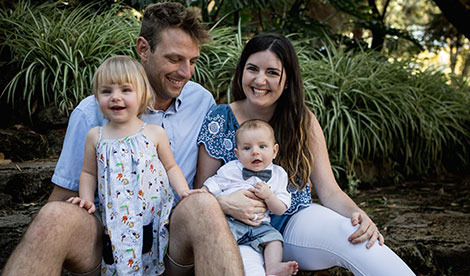

Blog

Meaning from mental illness – my story
Tuesday August 4, 2020
In 2017, I was admitted to the mental health unit at the hospital where I work. For two months after the birth of my daughter, I shouldered the then frightening diagnosis of a postpartum manic episode.
It was a terrifying experience to be so disorientated and thought disordered, and to be reliant on the help of others in those early days. The road that we have to travel to relocate from doctor to patient is rough. It’s a road marred by vulnerability and a lack of autonomy.
Despite the many challenges faced during this time by my family, friends and I, I do not regret the experience of postpartum mental illness. It taught me so much about myself, about mental health, and what it’s like to be on the other side of healthcare. Travelling this road brings a new and unshakeable understanding of what patient-centred care really means. More than this, it has fuelled my passion for advocating for doctor’s mental health and wellbeing.
As the dust settled on my acute illness, and I adapted to life with a newborn and this new and confronting diagnosis, I sought to derive some meaning from what I had gone through. A key part of that has been sharing my story, and the lessons it imparted.
Two of these lessons include:
- The importance of finding belonging in something outside of medicine; and
- That we doctors also need our own doctor.
These simple yet key ideas inspired the production of a short video, published on the Doctors’ Health Advisory Service of Western Australia (DHASWA) website – www.dhaswa.com.au under the Media/Videos section.
I share my story because I wholeheartedly believe that sharing stories is one of the most valuable tools that can be used to support mental health and wellbeing. Having said that, the available supports for healthcare workers struggling with mental health issues should be diverse, just as we are.
For me, hearing the stories of professionals such as Drs Angela Alessandri, Steve Robson, Sarah Newman and Geoff Toogood has been a really important part of my own journey.
For others, having access to helplines, advisory services, counselling services, websites and peer support programs will play a key role in helping them navigate maintaining mental health and wellbeing.
I view the journey through mental illness as though we are approaching a cliff, and falling. As we’re approaching the threshold of the cliff, there should be a variety of safety measures in place to support us.
The preventative measures that stop us from approaching that cliff? Strong relationships, job security, nutrition and exercise. And for those that stumble and fall, there should be multiple services available, ready to catch and help us before we come to harm. Not all support programs and services will suit each individual, and that’s okay. What’s never okay is to suffer in silence.
Dr Rikki Priest is a member of the Doctors’ Health Advisory Service, clinical senator, university educator, community champion with Perinatal Anxiety and Depression Australia, professional coach and Obstetrics registrar. She is pictured above with her husband Jason, son Jethro and daughter Isla.
Free confidential mental health counselling for doctors and medical students now available: 1300 374 377 (1300 Dr4Drs).

